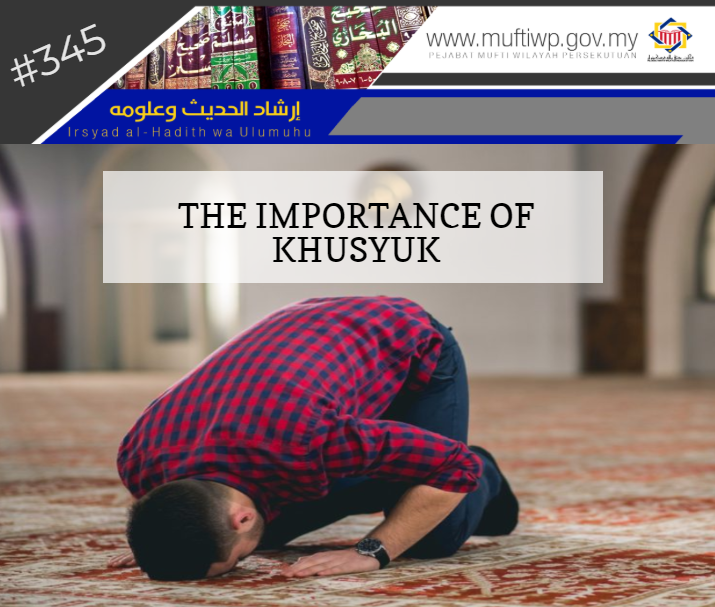Question:
What is the status of this hadith?
لَوْ خَشَعَ قَلْبُ هَذَا، لَخَشَعَتْ جَوَارِحُهُ
“If a person’s heart is in the state of khusyuk, so is all of his body,”
Answer:
Alhamdulillah, praise and thanks to Allah for the countless blessings He has blessed us all with. Blessings and salutations to the Prophet Muhammad PBUH, his wives, his family, companions and all those that follow his teachings to the day of judgement.
Khusyuk is included as sunnah hai’ah in prayer according to madhhab al-Syafie. As for the meaning of khusyuk, it means the presence of one’s heart during every recitation such as dhikr and supplication uttered by his tongue, thinking and contemplating on their meanings and feeling as though he is asking to Allah SWT.
In truth, khusyuk is something that should be continuous in prayer and prayer is invalid if a person’s heart is absent throughout the whole duration of the prayer, from the start to the end. (See al-Fiqh al-Manhaji, 96)
Maintaining khusyuk in all parts of prayer is sunnah for the completion and perfectness of the prayer. This is in accordance with a hadith from Uthman bin Affan RA: I heard the Prophet PBUH said:
مَا مِنِ امْرِئٍ مُسْلِمٍ تَحْضُرُهُ صَلاَةٌ مَكْتُوبَةٌ فَيُحْسِنُ وُضُوءَهَا وَخُشُوعَهَا وَرُكُوعَهَا إِلاَّ كَانَتْ كَفَّارَةً لِمَا قَبْلَهَا مِنَ الذُّنُوبِ مَا لَمْ يُؤْتِ كَبِيرَةً وَذَلِكَ الدَّهْرَ كُلَّهُ
“When the time for a prescribed prayer comes, if any Muslim performs ablution well and offers his prayer with humility and bowing, it will be an expiation for his past sins, so long as he has not committed a major sin; and this applies for all times.”
Sahih Muslim (228)
According to the above question, the above hadith is narrated by Imam Ibn Abi Syaibah and Imam Ibn Abd al-Razzaq in their musannaf. Furthermore, Imam al-Ghazali also places this hadith in his book. Among the scholars who evaluated this hadith or narration are:
- Imam al-Iraqi (806 H) when performing takhrij on this hadith in his book Ihya’ Ulum al-Din said this hadith is dhaif and in truth they are the words of Said bin al-Musayyib. (See al-Mughni, 178/1)
- Imam al-Suyuthi (911 H) evaluated the hadith as dhaif in his book. (See al-Jami’ al-Saghir, 237/2)
- Syeikh al-Ghazzi al-‘Amiriy (1061 H) said the sanad of this hadith is dhaif and it is famously known to be the words of Said bin al-Musayyib. (See Itqan ma Yuhsin min al-Akhbar, 459/2)
- Syeikh al-Albani (1420 H) ruled the hadith as fake in his book. (See Silsilah Ahadith al-Dhaifah wa al-Mawdhu’ah, 524/3)
- Syeikh Muqbil al-Wadi’iy (1422 H) in his book stated the hadith is not thabit from the Prophet PBUH. (See al-Fatawa al-Hadithiyyah, 308/2)
Considering the above opinions and evaluations, we are inclined to state that the hadith is very weak for there is a narrator who is majhul (unknown). Furthermore, the accurate statement about the hadith is that it is actually the words Said bin al-Musayyib and not from the Prophet PBUH.
Conclusion
To conclude, the above hadith is very weak. However, the meaning from the hadith is sahih. The reason is what is apparent in a person’s actions is actually the sign of what is hidden in his heart. Lastly, may Allah SWT protect our tongues from lying in the name of the Prophet PBUH. Amin.
Wallahua’lam.


